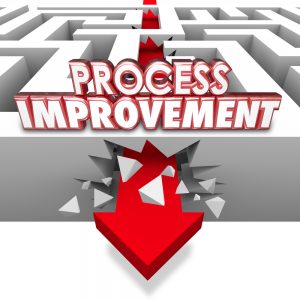When was the last time your integration business focused on process improvement?
Process management is an exercise in efficiency – it is all about doing the correct things while minimizing waste.
There are a lot of programs out there that address process standardization and improvement in more words than I’ll use — programs such as Lean, Six Sigma, Business Process Engineering, SIPOC (Supplier, Input, Process, Output, Customer), and so on. More study on any of these topics will certainly yield positive benefits, especially at an integration business characterized by many similar activities and deliverables over multiple projects.
I view process as simply how we do things. If you watch people and how they do something, you can measure their effectiveness (quality) and efficiency (speed and waste). You can look for areas to improve, steps that don’t add value, delays or wait times that could be removed, and steps that create errors, which then have to be checked and/or fixed by someone else.
But all processes start simply; we perform hundreds of them every day, often without conscious thought. When I teach, I use simple everyday examples to help explain concepts, rather than diving right into the work environment. So, with that in mind, I’d like to use a simple example of a simiple process and I’m confident you’ll be able to extrapolate to your job functions.
Cup of Joe
One morning I made a pot of coffee. I have a drip-coffee maker, so I put the paper filter in the basket, measured coffee into the filter, added water to the reservoir, and put the pot underneath. Some people I know put the water in first; put the pot underneath, then the filter, then the coffee. Both involve a slightly different process but achieve the same result.
How do you make coffee at home?
Some of you may have different coffee makers — a French press, a Keurig, maybe even a Bunn — and the type of machine makes a difference in the process. If it’s a Bunn, for example, you have to put in the water last — and from a different container — because a Bunn coffee maker operates differently than a typical drip coffee maker.
Now, if you never had a Bunn coffee maker before and received one as a gift, did you know to put the water in last, with a separate container, with the pot already underneath, so that you didn’t make a mess all over the kitchen counter?
And if you didn’t already know, did you find out in a good way or a bad way? Surely, there are people who figured it out the hard way; they used the coffee pot to put the water in first and it went all over the place.
In a lot of integration firms, people learn things the hard way.
Integrators that truly want to improve have to determine how costly it is to have a lot of their employees learn those lessons the hard way (in the case of the Bunn coffee maker, how wet is too wet for the counter and floor?). Companies need to look at process management from an organizational perspective, not just an individual perspective. If 10 people are going to make coffee and achieve a predictable result, they need to understand the machine and its supplies and determine the best way to make good coffee. They need to be proactive about understanding the process and its intended results — think about it; talk about it; measure, document and standardize it. Or the company can just say, “That coffee machine always pours coffee all over the place, so we buy a lot of paper towels to clean up the mess.”
How many roles/functions in your company include spending time fixing something that should not be a problem in the first place?
I am not talking about turning people into unthinking robots; I am talking about the need to consciously look at how people do things. A lot of organizations spend an incredible amount of time and money documenting perfect-world processes, yet they don’t really look at how their people do things now — on a daily basis — and determine how they can make small, incremental improvements.
The company must measure what it’s actually doing, not what it thinks or wishes it were doing. But what I find is that people don’t like to be measured. If you ask someone, “How do you do that?” they’ll say, “How do you want me to do it?” or “I’m doing it the way I was taught.” They are afraid that by measuring them, the company is judging them. Still, organizations need to watch how employees perform processes and assure them they are not measuring the employee, just the process, of which the employee is only one component.
Integration firms with mature leadership usually don’t have a judgment factor permeating their culture. In such organizations, the attitude is, “I’ll write down what I do, then we’ll get together and improve on it.” Improvement is based on the value the company needs to achieve, viewed from the client’s perspective, not based on ego or a need to be right. Mature companies document and improve their processes incrementally — in a nonjudgmental fashion — attempting to remove waste, variation, or steps that don’t add value. They don’t throw everything away and start over, blaming everyone who was ever involved in creating the process. That would be a recipe for disaster.
It is incumbent upon a mature organization to periodically and objectively (which doesn’t mean judgmentally or robotically) look at how people are doing what they are doing, and align it with why they’re doing what they’re doing.
Conclusion
Taking simple steps, I have seen integrators dramatically increase their efficiency, boost profits, and reduce waste. Creating efficiencies through process standardization and improvement also helps cut down occurrences of reactive drama or crisis modes and fosters greater commitment among all the organization’s employees because they feel responsible for improving how things work. They understand the linkage between cause and effect.
By Brad Malone
This article comes from our partners at Navigate Management Consulting
Would you like to learn more about process management? This is one of the topics covered at Navigate Academy a new online learning platform for systems integrators. Other topics covered include project management, business management, leadership and culture
Learn more at navigateacademy.net
Solutions360 is a proud sponsor of Navigate Academy’s next live webinar on Friday, June 5, 2020.



